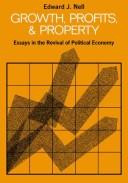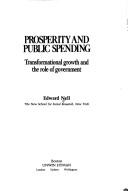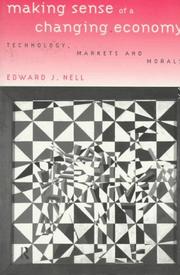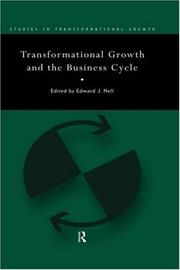| Listing 1 - 10 of 26 | << page >> |
Sort by
|

ISBN: 0521223962 0521319188 051157178X 0511865813 9780521223966 9780511571787 9780521319188 Year: 1980 Publisher: Cambridge Cambridge University Press
Abstract | Keywords | Export | Availability | Bookmark
 Loading...
Loading...Choose an application
- Reference Manager
- EndNote
- RefWorks (Direct export to RefWorks)
This collection of essays is designed to illustrate the variety, complexity and power of non-neoclassical economic thinking. The essays define the fundamental questions differently, employ different analytical tools and arrive at different conclusions. The two strands of non-neoclassical thinking that occupy most of the book are the neo-Keynesian and the neo-Marxian. The bulk of the book is composed of essays on microeconomics, macroeconomics, trade, comparative systems and welfare, with an unusual section on property rights and social hierarchy.
Economics --- Economics. --- 330.1 --- 338.22 --- 330.35 --- -Economic theory --- Political economy --- Social sciences --- Economic man --- Economische grondbegrippen. Algemene begrippen in de economie --- Economische organisatieleer. Economisch beleid. Economische politiek --- Economische groei. Kwantitatieve toename. Technische vooruitgang --zie ook {338.09} --- Addresses, essays, lectures --- -Economische grondbegrippen. Algemene begrippen in de economie --- 330.35 Economische groei. Kwantitatieve toename. Technische vooruitgang --zie ook {338.09} --- 338.22 Economische organisatieleer. Economisch beleid. Economische politiek --- 330.1 Economische grondbegrippen. Algemene begrippen in de economie --- -338.22 Economische organisatieleer. Economisch beleid. Economische politiek --- Economic theory --- Business, Economy and Management --- Political science. --- Administration --- Civil government --- Commonwealth, The --- Government --- Political theory --- Political thought --- Politics --- Science, Political --- State, The
Book
ISBN: 0043303390 0043303404 9780043303399 9780043303405 Year: 1984 Publisher: London
Abstract | Keywords | Export | Availability | Bookmark
 Loading...
Loading...Choose an application
- Reference Manager
- EndNote
- RefWorks (Direct export to RefWorks)
Economic order --- Free enterprise. --- Supply-side economics. --- Chicago school of economics. --- Rational expectations (Economic theory) --- United States --- Great Britain --- Chile --- Economic policy --- Economic policy. --- United States - Economic policy - 1981-1993. --- Great Britain - Economic policy - 1979-1997. --- Chile - Economic policy.

ISBN: 0043390447 0043390455 9780043390443 9780043390450 Year: 1988 Publisher: Boston, Mass. Unwin Hyman
Abstract | Keywords | Export | Availability | Bookmark
 Loading...
Loading...Choose an application
- Reference Manager
- EndNote
- RefWorks (Direct export to RefWorks)

ISBN: 0415136407 0415136393 9786610150953 1299285759 1134777531 0203980239 1280150955 9780203980231 6610150958 9780415136402 9781134777488 9781134777525 9781134777532 9780415136396 1134777523 9781299285750 9781280150951 Year: 1996 Publisher: London Routledge
Abstract | Keywords | Export | Availability | Bookmark
 Loading...
Loading...Choose an application
- Reference Manager
- EndNote
- RefWorks (Direct export to RefWorks)
This text presents an unorthodox view of the current state of economic theory and policies. Deriding the general trend for "econobabble", the author explains the reason why conventional wisdom in economics now seems irrelevant and looks to likely future scenarios.
Economic order --- economie --- Capitalism --- Consumption (Economics) --- Individualism. --- Moral and ethical aspects. --- Capitalism - Moral and ethical aspects. --- Consumption (Economics). --- Business. --- Individualism --- Business & Economics --- Economic Theory --- Moral and ethical aspects --- 241.67 --- Business ethics. Corporate ethics. Bedrijfscodes. Management en ethiek. Zakenmoraal --- 241.67 Business ethics. Corporate ethics. Bedrijfscodes. Management en ethiek. Zakenmoraal --- Consumer demand --- Consumer spending --- Consumerism --- Spending, Consumer --- Economics --- Equality --- Political science --- Self-interest --- Sociology --- Libertarianism --- Personalism --- Persons --- Demand (Economic theory)

ISBN: 0415148553 Year: 1998 Publisher: London Routledge
Abstract | Keywords | Export | Availability | Bookmark
 Loading...
Loading...Choose an application
- Reference Manager
- EndNote
- RefWorks (Direct export to RefWorks)
economic development --- Methodology of economics --- Economic geography --- Business cycles --- Economic development --- Cycles économiques --- Développement économique --- Case studies --- Cas, Etudes de --- Cycles économiques --- Développement économique --- Business cycles.

ISBN: 052159006X 0521023599 0511571798 9780521590068 9780511571794 9780521023597 Year: 1998 Publisher: Cambridge : Cambridge University Press,
Abstract | Keywords | Export | Availability | Bookmark
 Loading...
Loading...Choose an application
- Reference Manager
- EndNote
- RefWorks (Direct export to RefWorks)
For the last century, economic analysis has been wedded to the idea of equilibrium, in spite of the evident fact that most economic relationships are in flux. The theory of transformational growth in this work replaces equilibrium with history. The role of the market is not to allocate resources, but to generate innovations, which are 'selected' by competition in an evolutionary process. These innovations in turn change the way markets work and how they adjust, thus creating new problems and new kinds of pressures to innovate. Different historical periods can be distinguished with a new one perhaps on the horizon. In each a distinctive style of technology prevails, associated with corresponding institutions and patterns of market behavior. The core relationships provide the foundations for a theory of monetary circulation, which makes possible a revised Keynesian approach, based on Classical foundations.
Keynesian economics --- Economic development --- AA / International- internationaal --- 305.3 --- 331.00 --- 338.8 --- 331.01 --- 331.04 --- 338.043 --- 338.00 --- 330.156 --- Development, Economic --- Economic growth --- Growth, Economic --- Economic policy --- Economics --- Statics and dynamics (Social sciences) --- Development economics --- Resource curse --- Post-Keynesian economics --- Schools of economics --- Econometrie van de productiefuncties en van het gebruik van de capaciteiten (Cobb-Douglas functie) Econometrie van de groei. --- Economische bewegingen: algemeenheden. --- Economische groei. --- Evolutie van de economische cycli. --- Langdurige bewegingen. --- Technologische vooruitgang. Automatisering. Computers. Werkgelegenheid en informatica. --- Theorie van de productie. --- Econometrie van de productiefuncties en van het gebruik van de capaciteiten (Cobb-Douglas functie) Econometrie van de groei --- Economische bewegingen: algemeenheden --- Evolutie van de economische cycli --- Langdurige bewegingen --- Theorie van de productie --- Technologische vooruitgang. Automatisering. Computers. Werkgelegenheid en informatica --- Economische groei --- Business, Economy and Management --- Keynesian economics. --- Economic development. --- Keynésianisme. --- Développement économique.

ISBN: 0521319188 Year: 1984 Publisher: Cambridge
Abstract | Keywords | Export | Availability | Bookmark
 Loading...
Loading...Choose an application
- Reference Manager
- EndNote
- RefWorks (Direct export to RefWorks)
330.1 --- 338.22 --- 338.22 Economische organisatieleer. Economisch beleid. Economische politiek --- Economische organisatieleer. Economisch beleid. Economische politiek --- 330.1 Economische grondbegrippen. Algemene begrippen in de economie --- Economische grondbegrippen. Algemene begrippen in de economie
Book
ISBN: 0333494741 Year: 1992 Publisher: London : MacMillan,
Abstract | Keywords | Export | Availability | Bookmark
 Loading...
Loading...Choose an application
- Reference Manager
- EndNote
- RefWorks (Direct export to RefWorks)
Article
Year: 1957 Publisher: Den Haag : Mouton,
Abstract | Keywords | Export | Availability | Bookmark
 Loading...
Loading...Choose an application
- Reference Manager
- EndNote
- RefWorks (Direct export to RefWorks)
Book
Year: 1967 Publisher: [S.l.] : [s.n.],
Abstract | Keywords | Export | Availability | Bookmark
 Loading...
Loading...Choose an application
- Reference Manager
- EndNote
- RefWorks (Direct export to RefWorks)
| Listing 1 - 10 of 26 | << page >> |
Sort by
|

 Search
Search Feedback
Feedback About UniCat
About UniCat  Help
Help News
News